Lincoln Clay has a mission. If you've played any big open-world game of the last decade or so, you probably have a decent idea of what that mission is. In Mafia III, Lincoln is your archetypal revenge protagonist. Something has been taken from him; in this case, friends and adoptive family in a mob hit that should have left him dead too. In order to set things right, he has to tear through a detailed rendering of a familiar place--in this case, the city of New Bordeaux, which is loosely based on New Orleans circa 1968--laying waste to the various tiers of enemies that stand between him and the crime boss who betrayed him. You know this story. You know how this all plays out. You've avenged this sort of thing before.
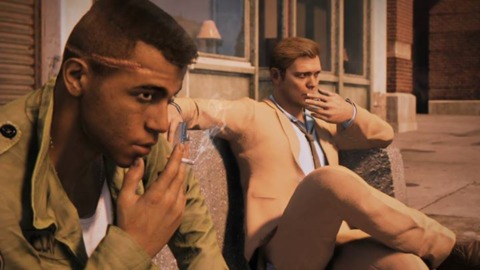
Yet for all its familiar trappings, Mafia III stands out. A big part of that is the game's chosen setting, and how its protagonist fits into it. Lincoln Clay is a black man in the civil rights-era American South. This is an especially fraught time in American history, and Mafia III doesn't shy away from addressing the deeply racist realities of the time. How it chooses to address those realities against the backdrop of a standard open-world action game, complete with the busywork and body count that come part and parcel with this genre, is sometimes a troubling thing, but it's troubling in a way that at least inspires some critical thinking. It tries, and more often than not, succeeds at making Lincoln feel at odds with the world around him. And while the game never quite transcends its pulpier storytelling inspirations, there's an unusual humanity to both Lincoln and the characters that surround him that make this story worth seeing through to its conclusion.
That story kicks off with one of the more audacious introductions I've seen in a game in a good, long while. Fresh from a tour in the Vietnam War, Lincoln returns to his hometown of New Bordeaux looking to reconnect with his family. That's "family" in the classic mafia sense, mind you. Lincoln has history with New Bordeaux's black mob, an outfit that mostly works under the umbrella of the city's major power, the Italian Marcano crime family. Upon returning, he joins up with his cohorts to help the Marcanos rob a US Treasury depository, in the hopes of rescuing his crew from an outstanding debt. It's a stylish and lengthy sequence, presented nonlinearly with snippets from a modern day documentary about Clay's legendary rampage against the New Bordeaux mob. It's all set-up, of course. There can't be a rampage unless there's something to rampage against. In this case, Lincoln and his people are betrayed by the Marcanos, shot and left for dead in the burning wreckage of his crew's neighborhood bar. Lincoln is the only survivor of the assault, and upon recovering from his nonfatal head wound, he vows swift and severe vengeance upon the family that wronged him.
This sequence also paces itself completely differently from the rest of Mafia III's campaign. The prologue is a contained affair, with discreet areas to play that act as tutorials for the sorts of things you'll end up doing once the city opens up. Once Lincoln is set upon his mission, the entirety of New Bordeaux becomes explorable, though missions won't appear on the map until you've set your designs on a particular district.
Like Saints Row and last year's Assassin's Creed: Syndicate, Mafia III is a game of conquering territory. Each district of the city is run by a particular lieutenant in Marcano's operation. When you first choose a district to focus on, a number of small mission objectives appear. These are all tied to various rackets that the lieutenants manage. Though the rackets themselves are varied, the way you go about dismantling them is largely the same: kill everyone that isn't of personal use to you.
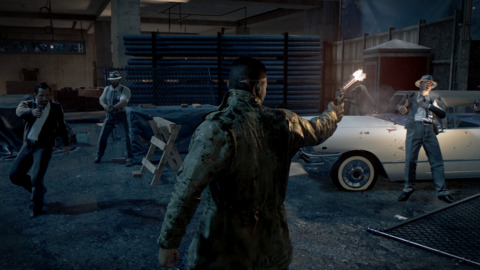
Mafia hangs its entire structure on gunfights. Yes, stealth is an option, and it's usually possible to lure a few dimwitted enemies to their doom just by whistling from around the corner and gutting them before they have time to react. But most situations still require at least a few bullets fired, and the game seems heavily tuned in favor of players engaging in full on hails of gunfire. The array of weapons included in Mafia III all pack a big punch, and enemies are specifically designed to die with maximum theatrics. Every bad guy seems to look for a nearby ledge to tumble over just before expiring, and if none is to be found, any piece of scenery ultimately ends up fitting the bill. Blood gushes everywhere, objects constantly explode, it's all a pulpy, violent mess.
That violence isn't inappropriate given the traditions of both the Mafia series and the open-world action genre in general. You know going into a game like this that by the end of it, you're going to leave a great deal of carnage in your wake. That the action is, by and large, satisfying, somewhat salves the feeling of repetition that sets in long before the game concludes. When I say that the game revolves around gunfights, I mean that in the near absolute. There's very little variety to Mafia III's mission designs. Occasional boostings of cars or destructions of properties only barely break up the hours upon hours of shootouts with extremely gullible guys sporting bomber jackets and/or giant sideburns. In a game with a less entertaining combat system, this would be ruinous. In Mafia III, I had a good enough time kicking doors down and shotgunning dudes through windows that I was mostly OK with it.
Eventually, all that grunt murdering draws out the big bad of the district. These are the big personalities of Mafia III, and the missions tied to them are easily the highlights of the game. They are, of course, still gunfights, but they take place in more interesting locations and let the writers stretch their legs a bit more. Of particular note are a fancy funeral turned LSD nightmare, and a big battle on a sinking riverboat as you hunt down big boss Sal Marcano's Foghorn Leghorn-sounding dumb ass of a brother.
Though you can sense a bit of blaxploitation influence in the game's villains, Mafia III's writers mostly avoid painting in overly broad strokes. That's most evident in the characters you ally yourself with during the course of the game. There's Cassandra, the leader of a Haitian gang who grudgingly aligns herself with you in the hopes of creating better opportunities for the predominantly black population of The Hollow. Burke is the former Jimmy Conway of the Marcano organization, an unmade Irish lieutenant on the outs after his son is killed during the prologue's post-robbery betrayal. And then there's Vito, who you may remember as the protagonist of Mafia II. He's a good bit older now, and in such deep water with the Marcanos that he's all but given up on living to see another day.
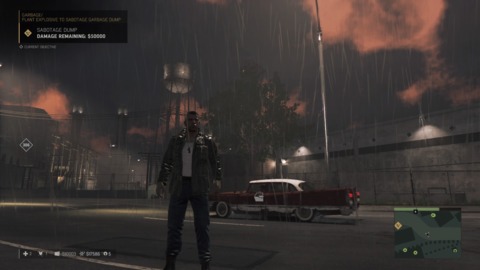
Everyone's motivated by understandable ends. Your lieutenants are all people wronged by the Marcanos in various ways, and they're all looking for their own kind of revenge against them. Those goals happen to align, but it's clear that the alliances you strike have to be managed. There's even a system built into the game that revolves around this. Each time you claim a territory you have the option to assign it to one of them during a sit-down. They'll each make their case for why they deserve to run this chunk of the city, usually a case made more emphatically if you've already assigned one or both of the rackets to them prior. Freeze one of them out enough times, and they may turn on you, unlocking a separate story mission you won't see if you manage to keep them happy.
It's a neat idea that's maybe a little too easily managed, given how volatile some of these personalities can be. I got through Mafia's campaign without having to fight any of my allies, and only once feeling like I was even close to that happening. It's a shame, because it's a good example of the way Mafia III tries to make the things you do in the game have some weight beyond the act of killing. It also makes the upgrade trees associated with those characters feel kind of moot, since keeping them all happy ensures that you'll never unlock any one tree to its full extent. Most of the benefits you'd want are unlocked early on, but that just makes the higher tier benefits seem superfluous.
All that said, keeping them all alive has its benefits too. The side missions you end up embarking on for each lieutenant offer up some additional backstory for each of them, and some of the strongest writing in the game crops up during these sequences. You learn about the various people who betrayed Vito and led him to the point of expecting death around every corner, discover the ties Burke still holds to the IRA and his frayed relationship with his surviving daughter, and grow to understand Cassandra's larger goal of arming the people of The Hollow against the myriad elements that would seek to oppress and destroy them.
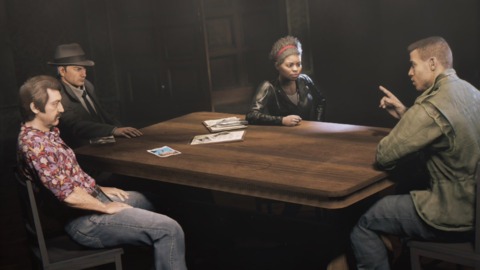
Cassandra's plight in particular feels like the thrust of what Mafia III ultimately wants to explore. This isn't a game content to just drape itself in the kinds of loaded imagery and language associated with this time and place. The kind of bald-faced racism of 1960s America isn't difficult to portray on its own. It's not hard to write a bunch of slurs into every dialogue sequence and include some comically evil Klan members to kick around. What's harder is to take that kind of miserable racism and apply it to the very structure of the world you're inhabiting. You see it in the smallest details, hear it in casual conversations between NPCs. Richer neighborhoods in the game offer a stronger police presence than poorer neighborhoods, and business owners don't hesitate to call them if you walk into a shop labeled "whites only." Rarely does an interaction take place in the game that doesn't remind you of the imbalance of power between people like you, and the people who hold sway in this city.
In one early cutscene, Lincoln visits a country club at the behest of the Marcanos, and as he walks up alongside Sal's son Georgi, a woman hurries past them, clutching at her purse and nervously eyeing Lincoln as he goes. It's tempting to point out that any preconception this woman might have about Lincoln is ultimately proved true. He is a criminal, prone to violence and theft. But at the same time, consider that he's there with Georgi, the brash, clearly unconcerned son of the city's most notorious crime boss. It's well-established in the game that the Marcanos are a visible entity in the city. People know who they are, and likely know what they are. Nobody at the country club seems afraid of Sal or Georgi, but in strolls Lincoln, and suddenly all eyes are fixated. It doesn't matter what terrible things you're into in New Bordeaux, so long as you're of the right complexion.
The game can absolutely be heavy-handed about this, and there are as many times where it betrays that feeling of oppression. After all, this is an open-world power fantasy, and for as much legwork as the script does to make the structural racism of the city feel realistic, it can never make things too oppressive for the player, otherwise the game wouldn't be fun. So while you're limited somewhat by police presence, in most situations you can still drive like a lunatic around the city and kill with impunity, so long as you do it just far enough away from the eyes of the law. And for as much humanity as the writers imbue Lincoln and his crew with, they're still violent, mostly unrepentant murderers. At times, the game seems like it wants to wrestle with this. Some late game conversations scratch at the notion that the only real difference between Lincoln and the men he's after is a slightly more rigid, but almost equally dubious moral code (not to mention the color of their skin). But it never goes too deeply into this, seeming content with simply raising the question while allowing its tale of revenge to play out mostly straightforwardly.
Still, in the context of a mass market video game, the sort where players are routinely asked to sympathize with killers because their cause is justified by one of a few interchangeable, focus-tested backstories, Mafia III's attempts to dig into the structural oppression of its era, and the ways in which that informs both Lincoln and Cassandra's choices, feel like a minor revelation. So often games seem content to wear the skin of political oppression, without delving too deeply into the realities of it. Mafia III doesn't do that. It lends weight to its story by painting its primary characters as deeply flawed, even sometimes believable human beings. Even its most cartoonishly vile personalities--of which there are a few--don't feel too far beyond the kinds of hateful mouthpieces we frequently see in today's political arena.
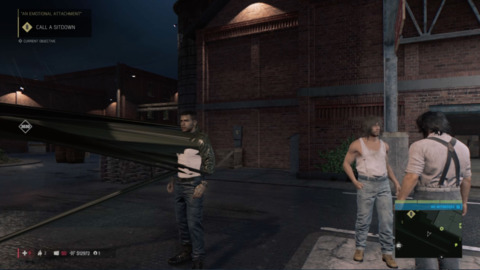
If anything ultimately does undercut Mafia III's aims, it's the game's lack of technical prowess. New Bordeaux is a diverse and lovingly rendered city, but bugs frequently crop up, often enough that the game has difficulty maintaining a sense of immersion. Most of these are merely of the annoying variety; glitchy textures and animations, broken physics, and the like. More severe issues, like side mission objectives appearing on the map when a side mission isn't actually active, and the odd crash bug, cropped up during my time with the game as well. In a less serious game, those kinds of issues would normally be a simple source of amusement. But in Mafia III, it robs scenes of intended impact when your jacket texture is tearing off in eight different directions, or the character you're hearing a tragic story from is inexplicably overlaid on top of a separate, immobile model of the same character.
Ultimately, technical gaffes and issues of design repetition weren't enough to stop me from appreciating Mafia III. The writers and voice actors turn in the strongest work, crafting and performing a story that manages to rise above the conventional open-world structure it's working within. When Mafia III does falter, it's where it most willingly gives in to those open-world conventions, resting back on the kinds of activities and mechanics we've seen done time and time again in games just like this. It's not unfair to want Mafia III to be better than it is, but I think it's still worth admiring for what it manages to pull off.